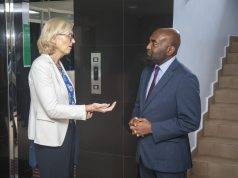
The impacts of climate change have already significantly affected livelihoods, especially of the poorest and most vulnerable communities. It is an open secret that, even though the Least Developing Countries have little responsibility in contributing to climate change, they are the ones most affected by its impacts, primarily due to high dependence on climate-sensitive resources and low adaptive capacity.
Excellencies,
Like many other LDCs, Tanzania is already affected by climate change and variabilities, with extreme events such as droughts and floods, unpredictable rainfall patterns, rising sea level and sinking islands resulting into food insecurity, water and social conflicts, disruption of livelihoods and major economic costs. Tanzania, for instance is estimated to have recorded economic losses to the tune of USD 33.7 million over the past ten-years due floods. In addressing climatic challenges. Tanzania has developed Nationally Determined Contribution (NDC) and the National Environmental Master Plan for Strategic Interventions (NEMSI), 2022-2032, which charts out strategic interventions to address environmental challenges based on their spatial variation. Priority actions and specific areas for interventions regarding climate change Adaptation and Mitigation have been identified. They include country wide tree planting, use of clean cooking energy, building small and medium sized dams to store rainwater for use during the year, and construction of seawalls for protection the coastline from erosion. I hereby, call upon our development partners for enhanced support to LDCs in Climate financing.
Excellencies,
In order to strengthen climate resilience, I urge that we ensure that climate change adaptation and mitigation issues are adequately mainstreamed in development plans, targeting sectors that are most vulnerable to climate change, such as agriculture, water and energy.
Finally, Regional and global partnerships are key pillars in finding solutions to the challenges that we face. In our case, priority areas of partnerships include: solar and wind energy, waste management disposal and green technologies. Let us collectively invest in appropriate innovative technologies to address climate change and associated challenges towards a better future.
I Thank You!






